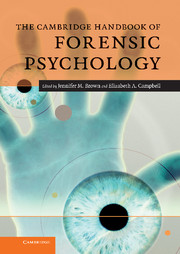Book contents
- The Cambridge Handbook of Forensic Psychology
- The Cambridge Handbook of Forensic Psychology
- Copyright page
- Dedication
- Contents
- Figures
- Tables
- Contributors
- Acknowledgements
- Forensic psychology:
- Part I Psychological underpinnings
- Part II Assessments
- Part III Interventions
- Part IV Psychology and criminal behaviour
- 4.1 Residential burglary:
- 4.2 Criminal careers
- 4.3 Interpersonal deception detection
- 4.4 Domestic violence
- 4.5 Genocide
- 4.6 Hate crime
- 4.7 Internet sexual offending
- 4.8 Murder:
- 4.9 Robbery
- 4.10 Sexual assault
- 4.11 Sexual fantasy and sex offending
- 4.12 Stalking
- 4.13 Terrorism research:
- Part V Psychology and civil law
- Part VI Special topics
- Part VII Professional practice
- Part VIII Research practice
- Author index
- Subject index
4.8 - Murder:
legal, psychological and investigative approaches
from Part IV - Psychology and criminal behaviour
Published online by Cambridge University Press: 06 July 2010
- The Cambridge Handbook of Forensic Psychology
- The Cambridge Handbook of Forensic Psychology
- Copyright page
- Dedication
- Contents
- Figures
- Tables
- Contributors
- Acknowledgements
- Forensic psychology:
- Part I Psychological underpinnings
- Part II Assessments
- Part III Interventions
- Part IV Psychology and criminal behaviour
- 4.1 Residential burglary:
- 4.2 Criminal careers
- 4.3 Interpersonal deception detection
- 4.4 Domestic violence
- 4.5 Genocide
- 4.6 Hate crime
- 4.7 Internet sexual offending
- 4.8 Murder:
- 4.9 Robbery
- 4.10 Sexual assault
- 4.11 Sexual fantasy and sex offending
- 4.12 Stalking
- 4.13 Terrorism research:
- Part V Psychology and civil law
- Part VI Special topics
- Part VII Professional practice
- Part VIII Research practice
- Author index
- Subject index
Summary
- Type
- Chapter
- Information
- The Cambridge Handbook of Forensic Psychology , pp. 527 - 534Publisher: Cambridge University PressPrint publication year: 2010
- 1
- Cited by

